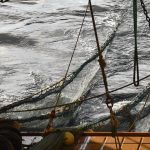Within the NFFO a wide range of views on the MSC can be found, from those who have obtained MSC accreditation for their fisheries, or are undergoing pre-assessment, to those who are philosophically opposed to a private standard-setting and accreditation body. These views were reflected in the questions and points raised at the meeting.
There is little doubt that the MSC has momentum and has reached take-off speed in recent months. We were advised that it took nine years for the first 1000 fisheries products to come under the MSC logo and nine months for the next 1000.
The MSC has a worldwide staff of 50, 30 of whom are based in the London headquarters. Its £5million running costs are met 60% through grants and foundations and 30% -35% through the licence to use its logo.
Amongst the issues raised during the course of the meeting were:
•The extent to which the MSC changes anything? Does not the MSC just gather “low hanging fruit”? In other words, the fisheries which for a variety of reasons already operate in ways consistent with MSC standards and criteria. Single stock fisheries will for example, always hold an advantage over complex, multi-gear, multi-species, multi-jurisdiction fisheries. This does not of itself move fisheries towards sustainability.
•The cost of assessment, annual audits and reassessments is very high. Where assessments are undertaken for one party there is no mechanism for sharing that information, even when another party in the same fishery applies for accreditation. This duplication and unnecessary cost loading is difficult to defend.
•There is concern about the MSC’s governance structures insofar as the accreditation criteria and standards have been established with minimal industry input. Apart from the issue of accountability, there is little real scope for the industry to maintain an ongoing and continuous dialogue with the MSC.
•Can the MSC logo demonstrate a real market advantage across all the fisheries holding the MSC logo?
•The MSC logo could mislead the “ethical consumer” because it is exclusively fishery based and does not take into account, for example carbon emissions and air miles embedded in a fishery product.
A constructive debate was had on all these issues. The MSC specifically responded to the points made on accountability and governance by reference to its efforts to outreach to the industry and making every effort to understand the challenges fishery by fishery.
It was agreed that the issue of cost sharing would be taken back to the MSC for specific consideration.








